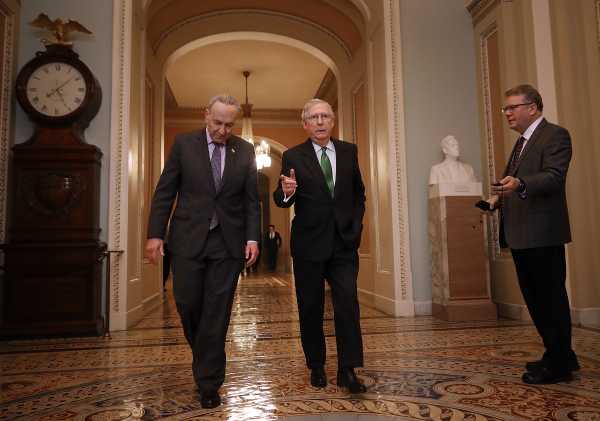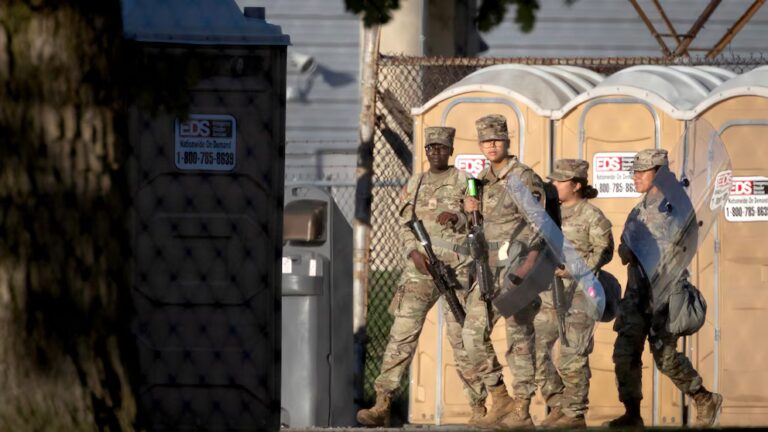
The partial government shutdown, now on day 34 — the longest in US history — will continue. The Senate failed to pass two proposals Thursday that would have reopened the government. And that was largely by design.
This was the first time the Senate has even voted on government spending bills since Congress let funding for nine federal departments expire in December. They took up two proposals: 1) a short-term spending bill to fund the government through February 8 without money for the border wall, which House Democrats have passed; and 2) a White House proposal, negotiated among Republicans, to open the government with $5 billion in funding for the border wall in exchange for a short-term extension of two existing immigration programs — Deferred Action for Childhood Arrivals and Temporary Protected Status, both of which the Trump administration has tried to sunset.
But neither bill ever had enough support in the Senate to pass. That said, six Republicans joined Democrats in voting for the short-term spending bill that didn’t include wall funding, a sign that President Trump’s position on the border wall isn’t fully backed within his own party. Only one Democrat, West Virginia Sen. Joe Manchin, who has always supported Trump’s wall, voted for the White House proposal (he voted in favor of both bills). Notably, Republican Sens. Tom Cotton (AR) and Mike Lee (UT), voted against the president’s proposal as well as the one proposed by Democrats. The Democrats’ proposal got more support than the White House’s in the end.
Still, Thursday was yet another show of just how little progress there has been in negotiations between Trump, Republican leaders, and congressional Democrats. Senate Majority Leader Mitch McConnell and Minority Leader Chuck Schumer were making a point: This isn’t going anywhere.
There’s been little real progress on ending the shutdown
House Speaker Nancy Pelosi and Trump haven’t spoken since January 9, when Trump abruptly left a meeting with Democratic leaders after Pelosi said she would never give Trump a “wall.” The White House has only dealt with rank-and-file moderate Democrats since.
Republicans crafted a “deal” on their own, without any real Democratic input, that seemed to miss the point of the stalemate altogether.
The impasse over the government shutdown ultimately comes down to a difference in priorities: Trump wants funding for his border wall before he will reopen the government, but Democrats aren’t interested in that. They’re saying Trump has to reopen the government first before they talk border security.
Democrats’ position has gotten some traction with Republican senators. Last week, Ohio Sen. Rob Portman went on the Senate floor and said he thinks there’s a reasonable compromise to be made with Democrats: reopen the government for a short period of time, with the assurance that they will negotiate border security in good faith, and use that time to actually strike a deal on the border wall. Portman himself voted against House Democrat’s short-term bill.
But several more moderate senators joined Democrats on the floor; six of them, Sens. Johnny Isakson (R-GA), Lamar Alexander (R-TN), Susan Collins (R-ME), Lisa Murkowski (R-AK), Mitt Romney (R-UT) and Cory Gardner (R-CO), voted for Democrats’ short-term spending bill.
The pains of the shutdown are growing by the day. Soon, hundreds of thousands of federal employees will go without their second paycheck. The Trump administration has already called tens of thousands of federal workers back to work without pay. On Wednesday, hundreds of federal employees filled a Senate building in protest of being forced to go without pay.
Social services, like food stamps and health programs for pregnant women and children, will run out of money by March. National parks are going without maintenance, and the shutdown is taking a serious toll on the nation’s economic growth. The American public overwhelmingly blames Trump for the shutdown and wants it to end. In other words, the cost of Trump’s fight for the border wall is much, much bigger than the $5 billion he is asking for — and lawmakers are noticing.
But for now, Democrats and Trump are taking an all-or-nothing approach. And as the Senate votes showed, as long as that’s the case the government shutdown will go on.
Sourse: vox.com






